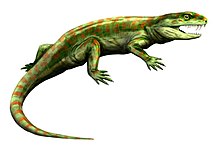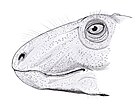Eothyris
| Eothyris Temporal range: Early Permian,[1]
| |
|---|---|

| |
| Holotype skull | |
| Scientific classification | |
| Domain: | Eukaryota |
| Kingdom: | Animalia |
| Phylum: | Chordata |
| Clade: | Synapsida |
| Clade: | †Caseasauria |
| Family: | †Eothyrididae |
| Genus: | †Eothyris |
| Type species | |
| Eothyris parkeyi Romer, 1937
| |
Eothyris is an extinct genus of the family Eothyrididae. It was an insectivorous synapsid. It was closely related to Oedaleops. Only the skull of Eothyris, first described in 1937, is known. It had a 6 centimetres (2.4 inches) long skull, and its total estimated length is 30 centimetres (12 inches).
Description

Eothyris is only known from its skull, which is short and broad. With a total skull length of 5.7 cm (2.25 in), Benson et al. estimated the body to be 30 cm (12 in) long. The major distinguishing features of the skull are that it possessed a pair of long, large, fang-like teeth on each side of the upper jaw. The use for these teeth is not known, but Eothyris might have used them to eat small prey. All teeth in its mouth were sharp and pointed, with all but the enlarged four fangs being small and short. The skull is short and broad, two features which suggest that Eothyris had a snapping, rapid bite.[1]
Classification
Eothyris is classified in the monophyletic family Eothyrididae. It is one of two genera in the family, the other being Oedaleops. The family is grouped in Caseasauria, and only cranial remains are known from it. The family is greatly supported, with nine dental and cranial features. Below is the cladogram of the analysis of Riez et al. (2009).[2]
References
Footnotes
- ^ a b Benson et al. 2012, p. 191.
- ^ Riez et al. 2009.
Citations
- Benson, R.; Brusatte, S.; Hone, D.; Naish, D.; Xu, X.; Anderson, J.; Clack, J.; Duffin, C.; Milner, A.; Parsons, K.; Prothero, D.; Johanson, Z.; Dennis-Bryan, K. (2012) [2009]. Ambrose, Jamie; Gilpin, David; Hirani, Salima; Jackson, Tom; Joyce, Nathan; Maiklem, Lara; Marriott, Emma; Nottage, Claire; van Zyl, Meizan (eds.). Prehistoric Life: A Definitive Visual History of Life on Earth. Dorling Kindersley. pp. 1–512. ISBN 978-0-7566-9910-9. OCLC 444710202.
- Reisz, R. R.; Godfrey, S. J.; Scott, D. (2009). "Eothyris and Oedaleops: Do these Early Permian synapsids from Texas and New Mexico form a clade?". Journal of Vertebrate Paleontology. 29: 39. doi:10.1671/039.029.0112.






